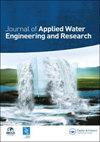Examination of the exponential wash-off function using experimental data
IF 1.6
Q4 WATER RESOURCES
Journal of Applied Water Engineering and Research
Pub Date : 2022-09-29
DOI:10.1080/23249676.2022.2125093
引用次数: 1
Abstract
The standard exponential wash-off function has been widely adopted in urban stormwater quality models and tested in many studies of sediment wash-off experiments. There is neither sufficient information on the wash-off coefficients for other types of pollutant nor a good mathematical interpretation that accounts for the effects of surface features on wash-off processes. This study assesses the standard exponential wash-off function using experimental data on the wash-off of various types of pollutant. In-situ wash-off experiments using simulated rainfalls were conducted in typical urban areas with various landuse. Experimental data from the literature were also analysed to support the examination. Mass balance requirement was always applied as a criterion in the experimental data analysis and wash-off model examination. The experimental results indicate that wash-off processes of organic pollutants (BOD5), nitrate (NO3), total oil and grease (TOG), total petroleum hydrocarbon (TPH) and coliform stochastically comply with the standard exponential function. Highlights In-situ wash-off experiments were conducted for BOD5, NO3, TOG, TPH, coliforms and TSS. Wash-off coefficients of BOD5, NO3, TOG, TPH, coliforms and TSS are identified stochastically. Mass balance requirement is introduced to examine the mathematical interpretations of wash-off models. An improved exponential wash-off function with more input parameters is suggested.利用实验数据检验指数冲刷函数
标准指数冲刷函数已被广泛应用于城市雨水质量模型中,并在许多泥沙冲刷实验研究中进行了测试。关于其他类型污染物的冲刷系数,既没有足够的信息,也没有很好的数学解释来解释表面特征对冲刷过程的影响。本研究使用各种类型污染物的冲刷实验数据来评估标准指数冲刷函数。利用模拟降雨在不同土地利用的典型城市地区进行了原位冲刷实验。还对文献中的实验数据进行了分析,以支持这项研究。在实验数据分析和冲刷模型检验中,质量平衡要求一直被用作一个标准。实验结果表明,有机污染物BOD5、硝酸盐NO3、总油脂TOG、总石油烃TPH和大肠菌群的冲刷过程随机符合标准指数函数。重点对BOD5、NO3、TOG、TPH、大肠菌群和TSS进行了原位冲刷实验。对BOD5、NO3、TOG、TPH、大肠菌群和TSS的冲刷系数进行了随机测定。引入质量平衡要求来检验冲刷模型的数学解释。提出了一种具有更多输入参数的改进指数冲刷函数。
本文章由计算机程序翻译,如有差异,请以英文原文为准。
求助全文
约1分钟内获得全文
求助全文
来源期刊

Journal of Applied Water Engineering and Research
WATER RESOURCES-
CiteScore
2.90
自引率
16.70%
发文量
31
期刊介绍:
JAWER’s paradigm-changing (online only) articles provide directly applicable solutions to water engineering problems within the whole hydrosphere (rivers, lakes groundwater, estuaries, coastal and marine waters) covering areas such as: integrated water resources management and catchment hydraulics hydraulic machinery and structures hydraulics applied to water supply, treatment and drainage systems (including outfalls) water quality, security and governance in an engineering context environmental monitoring maritime hydraulics ecohydraulics flood risk modelling and management water related hazards desalination and re-use.
 求助内容:
求助内容: 应助结果提醒方式:
应助结果提醒方式:


